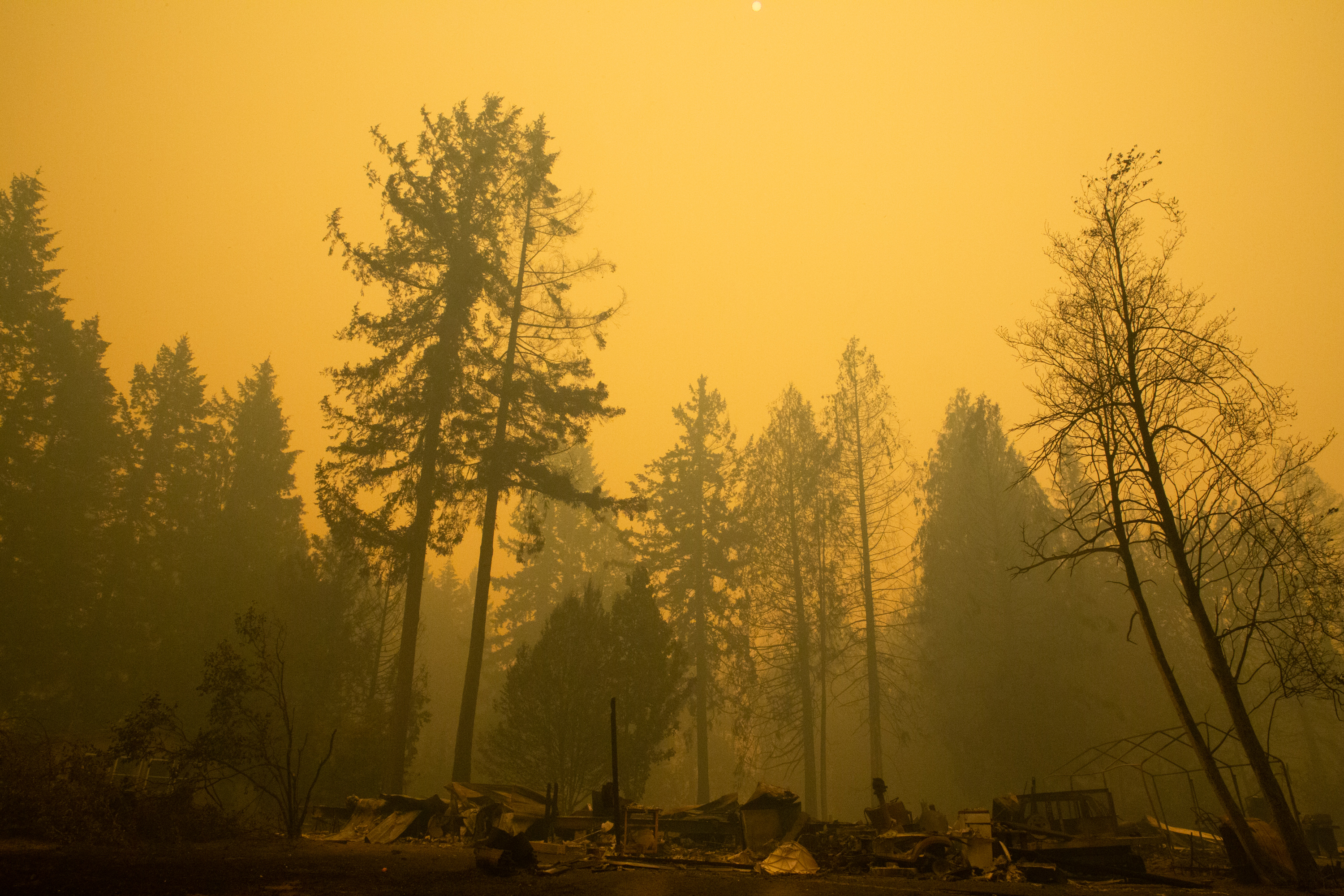
The charred remains of a home burned in the Santiam Fire near Gates, Ore., Sept. 9, 2020.
Bradley W. Parks / OPB
As devastating wildfires began to spread in Oregon the day after Labor Day 2020, PacifiCorp senior transmission engineer Tyler Jones texted his co-worker.
“This weather is crazy man,” wrote Jones, using the company’s Skype messenger service.
“90 mph gusts haha,” replied Pavel Grechanuk, a PacifiCorp fire data scientist. “That will blow your socks off.”
The pair exchanged messages sporadically for the next 45 minutes, marveling at the east winds and joking about wildfires that would go on to kill at least nine people, destroy thousands of homes and burn more than 1 million acres.
“God the fires near our service territories are right underneath our lines….,” Grechanuk wrote, noting the company’s equipment was near some of the earliest starting points of the fires.
“Lol,” Jones replied. “Ugh. Man this is going to get crazy.”
After sharing a few more messages and images of the thick black smoke pouring across Oregon, Grechanuk again worried that PacifiCorp might have played a part in starting the blazes.
“God I just hope it was another baby shower and not us,” he typed, possibly referring to the El Dorado Fire in California, which ignited Sept. 5, 2020, after a couple shot off a smoke device during a gender reveal party.
Attorneys in a class action lawsuit for people harmed by the Labor Day fires in Oregon say the messages and other evidence presented in a court filing Tuesday show PacifiCorp knew early on it likely played a role in starting the fires. OPB has previously reported on 911 calls that indicated people living near Gates, Oregon, witnessed sparking power lines around the time the fires began.
The lawyers also allege in their motion that PacifiCorp willfully destroyed evidence that might show its involvement, and that the company has used delay tactics to prevent plaintiffs in the case from gathering key evidence ahead of a planned trial April 24.
PacifiCorp has paid out millions of dollars in settlements before related to wildfires in Oregon – including as recently as November for its alleged role in the 2020 Archie Creek Fire in Southern Oregon – but the class action lawsuit could have major financial repercussions. It alleges the corporation, a subsidiary of the investment company Berkshire Hathaway, should be liable for the destruction caused by the Santiam Canyon, Echo Mountain, South Obenchain and 242 fires.
In each of those fires, attorneys for the class action plaintiffs say PacifiCorp has either destroyed or intentionally delayed handing over evidence pointing to their involvement.
PacifiCorp did have a plan for shutting off power for public safety during high winds, low humidity and dry vegetation in 2020, but company officials told The Salem Journal-Statesman they did not initiate that plan in Gates and surrounding communities because those areas weren’t in the company’s designated “Public Safety Power Shutoff” zone. Messages between Jones and Grechanuk show them talking about “PSPS thresholds” in another area hit by fires.
Tuesday’s court filing says the company knew Skype messages like the ones Jones and Grechanuk exchanged would show PacifiCorp employees talking in real time during the Labor Day fires. Still, the company did not force its employees to retain these messages as part of any future legal proceedings, according to the attorneys.
The exchanges between Jones and Grechanuk were only preserved when an email program synced with Skype in an unplanned event. Attorneys in the case say they still don’t know if other messages exist or if PacifiCorp completely destroyed them when it decommissioned a computer server in March 2021 that handled the messages.
The attorneys also collected testimony from North Lincoln Fire & Rescue Chief Robert Dahlman, who said that in the week after the Labor Day fires, Pacific Power workers repeatedly crossed fire lines near Otis, Oregon, to carry out power repairs after Dahlman and other firefighters told them not to.
“PacifiCorp and their contractors multiple times crossed through our closed areas and went back in to repair their equipment. And it came to a head with the overall incident commander and myself,” Dahlman said during a deposition ahead of the trial.
Pacific Power workers then destroyed poles, power lines and vegetation, the attorneys allege, despite a fire investigation that was underway.
“PacifiCorp testified that the damaged equipment associated with the Santiam Canyon Fire ‘was taken to one or two spots and then probably taken to a dump,’ before any investigation was undertaken,” the attorneys wrote.
The plaintiffs’ attorneys also allege that PacifiCorp has underprepared key witnesses in the case to answer questions about the company’s power line management on the day the fires ignited. After failing to answer a series of questions about trees near the starting point of the 242 Fire during a Jan. 27 deposition, an attorney for the plaintiffs pressed claims adjuster Marlow Vass on how much preparation she had done to review the thousands of documents related to the lawsuit.
“I would say about three to four hours,” Vass replied.
Neither the attorneys bringing the class action lawsuit, nor PacifiCorp provided comment for this article, citing the pending litigation. PacifiCorp has denied any wrongdoing in its court filings.
Still, the company has changed some of its practices since the fires. Last year, PacifiCorp announced a plan to spend more than $400 million on wildfire safety improvements to reduce the risk of power lines sparking fires during extreme weather.
Because issues around evidence have come up before in the class action lawsuit, and because the April trial is rapidly approaching, attorneys for the plaintiffs in the case have asked Multnomah County Judge Steffan Alexander to sanction PacifiCorp while finding its actions “willful, bad faith, or of similar magnitude.”
The lawyers also want Alexander to throw out PacifiCorp’s denials of its liability in the Labor Day fires, and potentially make a final determination on the power company’s role.
